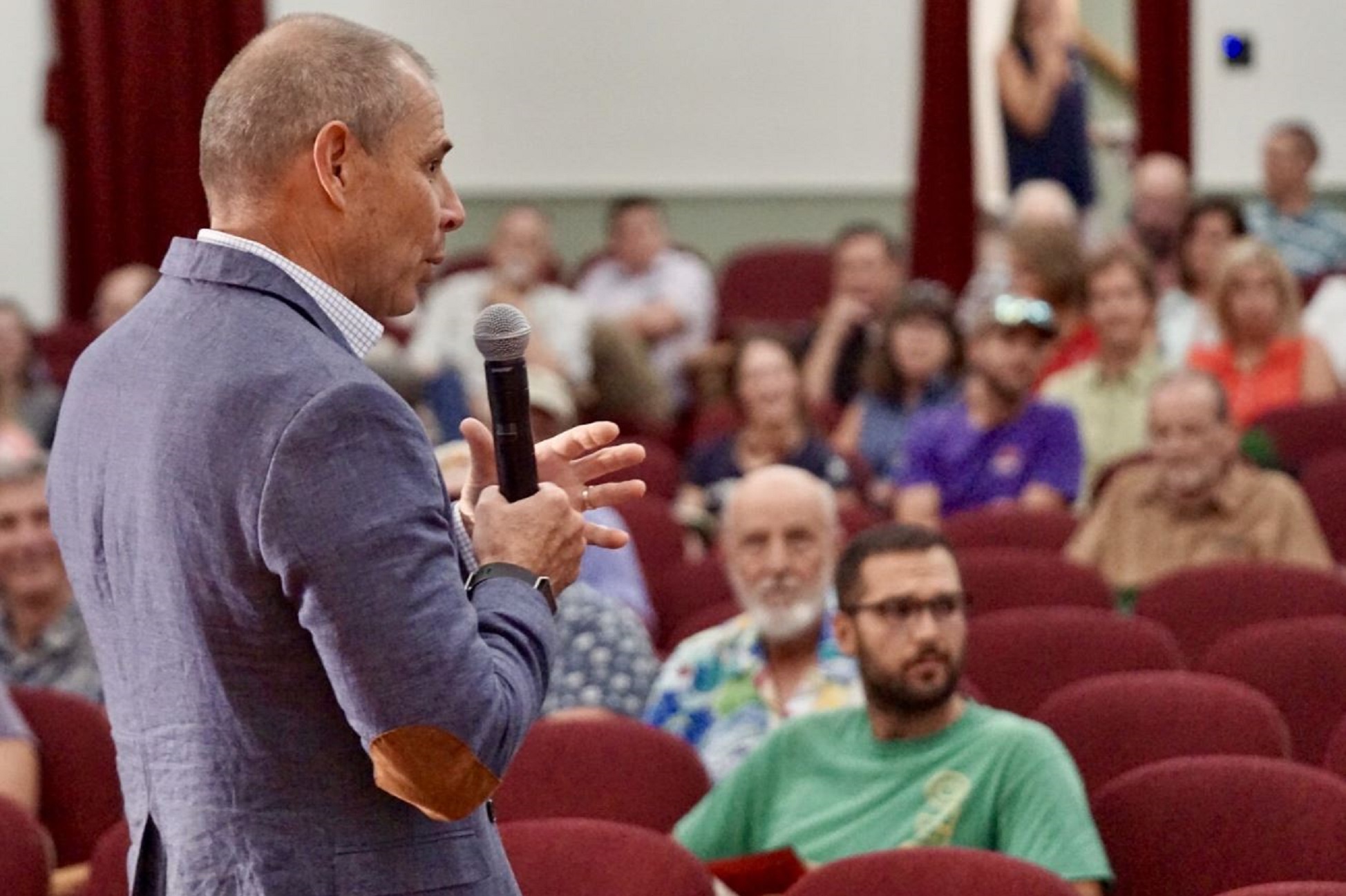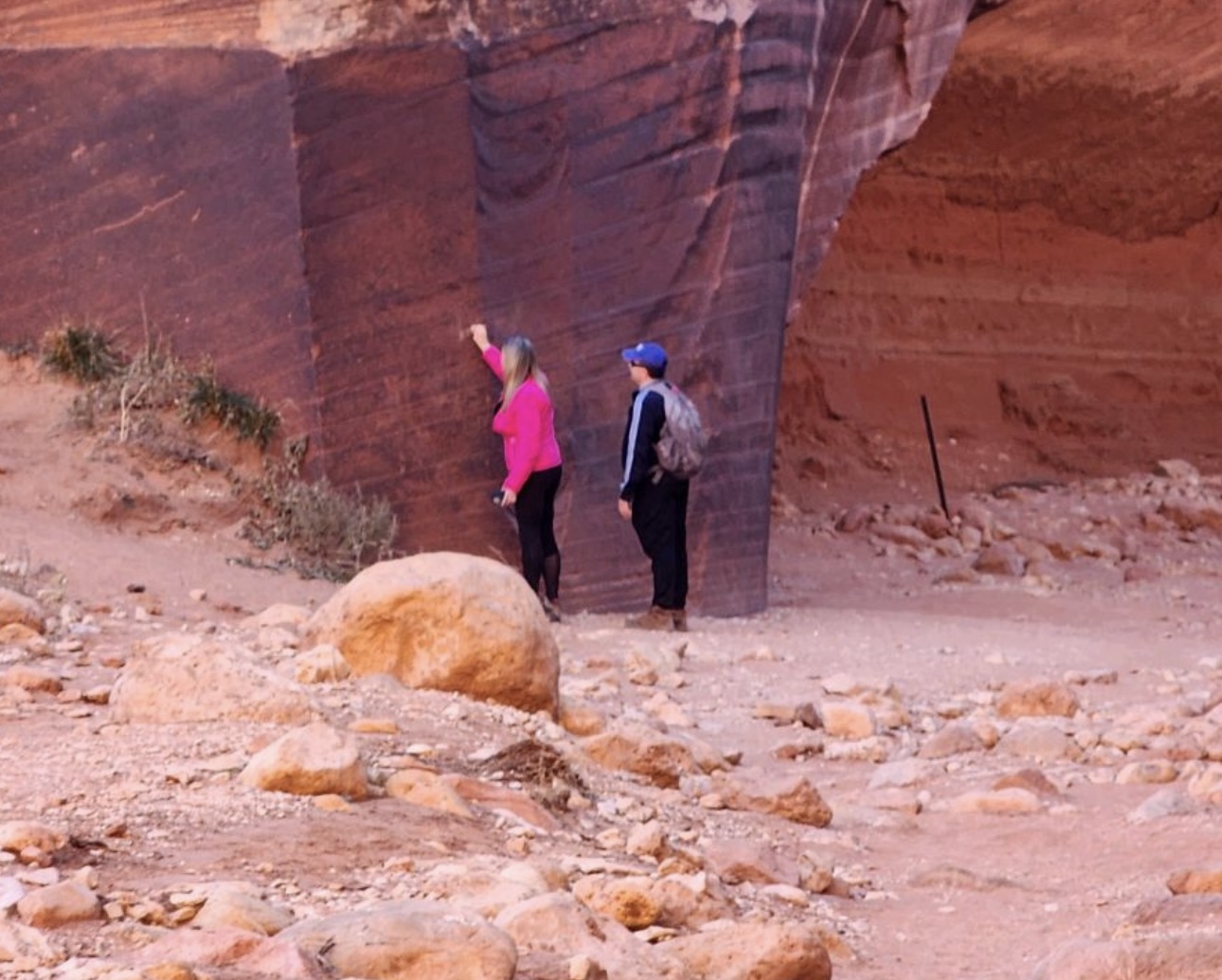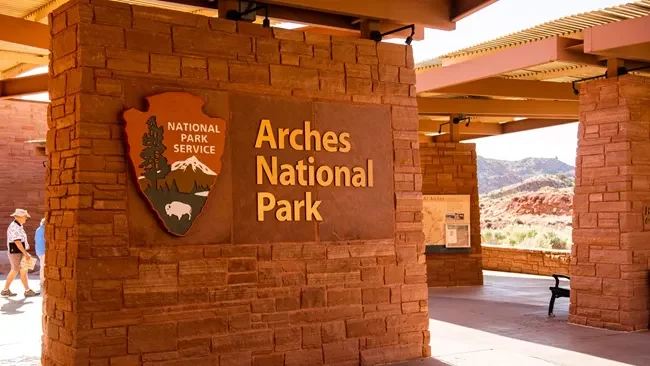Some information may be outdated.
John Curtis, the representative for Utah’s 3rd congressional district, visited Moab on March 31 for a town hall meeting held at Star Hall. Curtis fielded questions from community members on issues ranging from solar panel investment to allegations of 2020 election fraud.
“This man comes and faces our tough questions. We can all disagree with each other, but we can do it with respect and dignity,” said Grand County Commission Chair Mary McGann in his introduction.
First, Curtis acknowledged the national and congressional rift in Washington, D.C. caused by the Jan. 6 assault on the Capitol.
“To me, that’s going to be like a 9/11 moment, where things are never quite the same afterwards,” he said. The political divide in Congress, Curtis continued, was only exacerbated by coronavirus-era remote voting and discussion.
“Congress, right now, is not interacting. When we used to go vote on the House floor, 435 of us would be in there mingling around, talking to each other, enjoying each other’s company, talking about bills and what we can work on together. We’re not doing that anymore.”
Before answering residents’ questions, Curtis also acknowledged the long-brewing controversy over Bears Ears National Monument. Recently, Utah’s congressional delegation, including Curtis, wrote a letter to President Biden in early March asking him to hold off on taking executive, unilateral action regarding the monument, and to instead allow Congress to reach a solution. Curtis reinforced this stance at the town hall.
“We’re in the worst of situations ping-ponging back and forth between presidents, pushing [the monument] forward and pulling it back in,” he said. “That’s just a terrible way to manage the land.”
Deb Haaland, formerly a Democratic representative for New Mexico, will be the third Secretary of the Interior to weigh in on Bears Ears management as she visits Utah this week.
“Normally, legislation of this magnitude would take decades to do. We would understand if after six months of us trying to find a solution, the president went forward to protect the area,” Curtis said about potentially finding a legislative solution to the Bears Ears controversy.
The town hall was one of the first in Moab to be held in-person since the COVID-19 pandemic began in March 2020. Masked and distanced, Moab residents filed into Star Hall’s auditorium, feeling a sense of hope that things may soon return to normal.
“It’s an amazing honor to serve Grand County,” Curtis told the Moab Sun News. “It’s no secret that I have different political affiliations than many of them, but they always make me feel welcome here. And I appreciate that.”
Addressing Trump, Capitol invasion
Several residents asked about Curtis’ own experience during the Jan. 6 breach of the Capitol and why he condemned President Trump for his actions on that day, asserting that the invasion was “an act of domestic terrorism inspired and encouaged by our president” in a statement at the time.
“I flew around this country before the election to campaign for President Trump with my wife in the middle of COVID. I defended him twice in impeachment hearings. I shouted from the housetops how much I loved a lot of the policies he did,” Curtis said at the town hall. “But on Jan. 6, I had people come after my life. And the president of the United States, a couple of hours after he had done nothing, told those people who came after my life that he loved them and that it was time to go home.”
His response was met with applause.
But Curtis also said that “we don’t know” whether Trump was innocent regarding the Jan. 6 incident. The reason for that, he said, was because of a rushed, 48-hour impeachment trial.
Curtis voiced support for a bipartisan commission to look more closely into the events of the Capitol invasion to “dig in and get those answers which the American people deserve.”
Curtis talks climate, recent House bills
Curtis, a self-proclaimed “climate conservative,” also spoke about how to best reconcile Republicans and Democrats when it comes to climate issues.
“To my Republican friends: We’ve made a terrible mistake by not engaging on climate. We have allowed ourselves to be branded as not caring about the environment, and that’s just simply not true,” he said. “To my Democrat friends, let me offend you equally as well. You’ve got to get off the extremes.”
Climate, Curtis argued, has become a “way too partisan” discussion. He voiced support for more solar panels in Moab and across Utah as a cheap, reasonable solution for renewable energy.
“Because I’m a Republican, I’m taking on the Republican problem and trying to get more Republicans at the table,” he continued. “I want you to know that Republicans are trying to figure out how to engage on this.”
Segueing into a conversation about infrastructure, Curtis commented on Biden’s proposed American Jobs Plan, which would invest $4 trillion in rebuilding and modernizing America’s infrastructure.
“I think he can pass [the American Jobs Plan] if he wants to,” Curtis said. “A much better solution for the country, and I actually believe for President Biden, would be to stop and ask Republicans to participate and get a bipartisan consensus on what needs to be done on infrastructure.”
Another controversial bill that recently passed in the House was the Equality Act, one of Biden’s top legislative priorities for his first 100 days in office. The bill would amend the 1964 Civil Rights Act to also ban discrimination based on gender identity and sexual orientation.
“I believe this strongly: We do not need to give up religious liberty in order to treat everybody as equals. That’s a false question that’s been put before us — to say that we have to choose one or the other,” said Curtis at the town hall. He referenced a bill introduced by his colleague Rep. Chris Stewart (R-UT), the Fairness For All Act, which would allow people to object to provisions within the Equality Act because of their religious beliefs. The Fairness For All Act has received support from The Church of Jesus Christ of Latter-day Saints but has been condemned by the LGBTQ+ community and human rights advocates.
“I’d like to see if we can get some momentum behind that bill that gets a great message coming from Utah that we don’t believe in discrimination based on sexual orientation in the least, but we also believe we can have religious freedom,” Curtis added.
Appreciate the coverage? Help keep local news alive.
Chip in to support the Moab Sun News.





